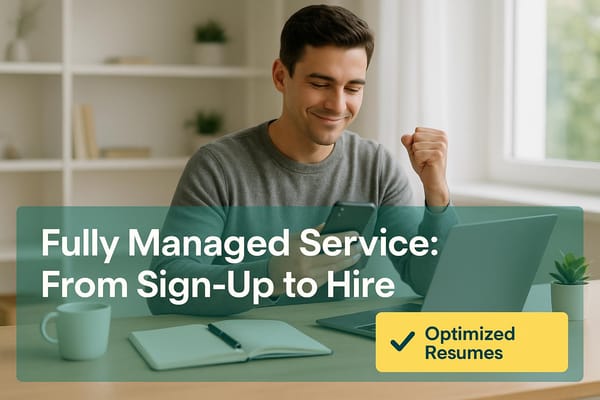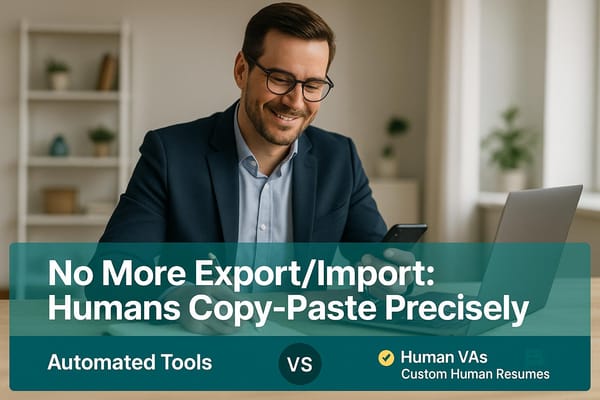Top 5 Webinars on Transferable Skills for Interviews
Explore five essential webinars that teach you how to effectively communicate transferable skills during job interviews.

Want to ace your next job interview? Learn how to showcase your transferable skills effectively with these 5 webinars. Transferable skills - like leadership, communication, and problem-solving - are essential for career changes, industry switches, or overcoming gaps in experience. These webinars offer step-by-step guidance, hands-on exercises, and expert feedback to help you stand out in interviews. Here's what you'll find:
- Using Transferable Skills in Job Interviews: Learn the STAR method to create compelling answers.
- Transferable Skills for Changing Careers: Role-playing exercises and strategies for career transitions.
- 10 Transferable Skills for Career Change: Identify and communicate key skills with practical tools.
- Talking About Transferable Skills in Interviews: Master a simple formula to connect your skills to the role.
- 5 Tips for Using Transferable Skills in New Careers: Actionable strategies to adapt skills for new industries.
These webinars are perfect for job seekers, career changers, or anyone navigating layoffs or visa challenges. Start building confidence and crafting responses that impress employers.
Related video from YouTube
1. Using Transferable Skills in Job Interviews
This webinar, led by experienced career coaches, offers practical tips to help job seekers highlight their transferable skills during interviews. The session is designed to guide participants in turning their past experiences into assets that appeal to potential employers.
What You’ll Learn:
- Break down interview questions to identify key skills employers are looking for.
- Create strong, example-driven answers.
- Connect previous experiences to new roles and industries.
Participants will practice using the STAR method (Situation, Task, Action, Result) to clearly communicate their skills. Through hands-on exercises, attendees gain confidence in tailoring their responses to fit various scenarios:
| Interview Context | How to Apply Transferable Skills |
|---|---|
| Career Transition | "In my previous role, I led a team of 5 to improve efficiency by 30%, showing leadership and project management skills." |
| Industry Switch | "My customer service experience directly applies to managing stakeholders in this field." |
With the increasing importance of transferable skills, this session provides tools like templates and guides to help participants build a skills portfolio and craft personalized interview answers.
This webinar also complements other resources aimed at simplifying job applications, giving candidates a better shot at landing their next role. For those exploring career changes, the upcoming session will focus on adapting skills for entirely new industries.
2. Transferable Skills for Changing Careers
This webinar is designed to guide professionals through career transitions by focusing on how to apply their existing skills effectively. It emphasizes hands-on learning with role-playing exercises and expert feedback, making it more practical than many other sessions.
The program is divided into three main learning segments:
| Learning Segment | Key Takeaways |
|---|---|
| Skills Assessment | Identifying skills that are valued across various industries |
| Communication Strategy | Developing strong narratives to highlight past experiences effectively |
| Implementation | Practicing with real-world scenarios and receiving actionable feedback |
Participants engage in interactive role-playing and Q&A sessions with industry experts, helping them refine how they present their skills and value to potential employers [1].
Key Focus Areas
- Leadership, communication, and stakeholder management
- Problem-solving and analytical thinking
- Flexibility and the ability to learn quickly
A highlight of the webinar is the Industry Translation Workshop, where attendees learn to connect their current skills to new career paths. This workshop shows how existing strengths can solve challenges in different industries and roles.
Additionally, participants work on tools like ATS-friendly resumes and build development plans to keep their skills up to date. For those navigating career changes while managing visa restrictions or recovering from layoffs, the webinar offers tailored strategies for showcasing cross-cultural skills and flexibility - key assets in today’s job market.
If you’re thinking about a complete career overhaul, the next webinar will explore the top transferable skills that can help you thrive in a new industry.
3. 10 Transferable Skills for Career Change
This webinar is designed to help professionals identify and communicate transferable skills that are valued across various industries. Led by experts in career transitions, it offers practical strategies tailored for those exploring new career paths.
The session breaks down key transferable skills into two categories:
| Category | Skills | How They Apply |
|---|---|---|
| Technical Skills | Project Management, Data Analysis, Digital Literacy | Show flexibility in adapting to tools and systems |
| Soft Skills | Communication, Leadership, Team Collaboration, Stakeholder Management | Highlight workplace examples to showcase versatility |
One standout feature of the webinar is the Industry Translation Framework, which guides participants to:
- Evaluate their skills through hands-on self-assessments.
- Craft strong narratives that align with the expectations of their target industries.
- Develop action plans to effectively present their skills.
Interactive elements are a key part of the session. Participants practice presenting their skills in mock interviews and receive expert feedback. For those navigating visa requirements or career transitions, the webinar offers targeted advice on tailoring skills to meet specific needs.
Through practical exercises, attendees will:
- Pinpoint their most marketable transferable skills.
- Match their skills to the demands of their chosen industries.
- Build confidence in communicating their value to employers.
The session also covers strategies for ongoing skill development and provides resources for continuous learning. Attendees leave with tools for immediate use in interviews and a roadmap for long-term career growth.
For those ready to put these skills into action, the next webinar focuses on actionable interview tips to help secure new opportunities.
4. Talking About Transferable Skills in Interviews
This webinar is all about helping job seekers confidently discuss their transferable skills during interviews. It introduces a straightforward formula to make your responses stand out: describe the skill, share a specific example, and connect it to the role you're applying for. This method ensures your answers grab attention and highlight your value to the employer.
| Interview Response Component | Purpose | Example Application |
|---|---|---|
| Skill Description | Clearly explain the transferable skill | Critical thinking and problem-solving |
| Concrete Example | Share a specific instance where you used the skill | Results from a past project, backed by metrics |
| Role Connection | Tie the skill to the job's requirements | Explain how the skill meets the position's needs |
Participants get hands-on practice through role-playing and interactive exercises, where they learn to customize their responses to typical interview questions. Experts provide real-time feedback, helping attendees pinpoint the skills employers prioritize and avoid common mistakes.
The session also offers practical ways to track interview performance using metrics like callback rates. This approach helps participants refine how they present their skills and continuously improve their interview techniques.
For those switching industries or roles, the webinar provides strategies to reframe specialized skills for broader applications. The interactive format ensures attendees leave with practical experience in showcasing their transferable skills effectively.
The next webinar builds on these skills, offering actionable advice for applying them in entirely new career paths.
5. 5 Tips for Using Transferable Skills in New Careers
Switching careers can be daunting, but knowing how to leverage your transferable skills can make the process smoother. This webinar focuses on actionable strategies to help you apply your existing skills in new roles, with proven methods tailored for career changers.
| Tip | Strategy | Application |
|---|---|---|
| Skills Assessment & Alignment | Match your current skills to the requirements of the new role | Use specific examples to show how your abilities meet the job's needs |
| Achievement Documentation | Track and quantify your past successes | Highlight measurable results during interviews |
| Question Response Strategy | Study common interview scenarios | Frame answers to clearly connect your skills to the role |
| Industry Adaptation | Research how skills are applied in the new sector | Show how your experience translates effectively to the new field |
For example, if you're a teacher moving into corporate training, you could emphasize your expertise in managing stakeholder relationships and designing learning programs. This approach shows how your background can bring value to a different industry.
The session also tackles common mistakes, such as failing to align your skills with job requirements or giving vague examples. Through guided exercises, participants learn to develop clear, tailored responses that demonstrate their fit for the role.
To wrap up, the webinar provides strategies for ongoing skill development, helping attendees build confidence in showcasing their abilities. Armed with these techniques, job seekers can effectively communicate their transferable skills and secure exciting new opportunities.
Conclusion
These webinars offer actionable strategies for jobseekers to pinpoint, express, and present transferable skills across various industries. Through sessions led by experts, attendees gain the tools to speak with confidence during interviews and craft clear, impactful narratives about their professional strengths.
| Webinar Insights | How They Help in Your Job Search |
|---|---|
| Identifying Transferable Skills | Match your existing skills to new roles effectively |
| Improving Communication | Deliver confident, polished answers in interviews |
| Better Interview Prep | Showcase how your abilities meet job requirements |
For those facing career transitions or visa-related hurdles, these webinars deliver tailored advice on applying existing skills to fresh opportunities. With hands-on exercises and practical examples, participants learn to create strong, persuasive stories about their abilities.
Want to take it a step further? Tools from Scale.jobs, like the Interview Questions Predictor and Resume ATS Checker, align perfectly with the webinar's lessons. These tools let you refine your approach and ensure you're ready to tackle the job market with confidence.
Building strong communication around transferable skills isn't a one-time effort - it’s a continuous journey. Pair these strategies with consistent learning and practical tools to navigate career changes and leave a lasting impression in interviews.
FAQs
What are some examples of transferable skills and how can they help you obtain an interview and ultimately a new job?
Here’s a breakdown of key transferable skills and how they can make a difference in job interviews:
| Skill Category | Examples | How It Helps in Interviews |
|---|---|---|
| Leadership | Decision-making, Team management | Showcases your ability to lead projects and mentor others. |
| Communication | Public speaking, Building rapport | Highlights your ability to clearly express ideas and connect with others. |
| Analysis | Researching, Problem-solving | Demonstrates your critical thinking and ability to tackle challenges. |
| People Skills | Counseling, Providing feedback | Reflects emotional intelligence and teamwork capabilities. |
| Organization | Time management, Project coordination | Proves your efficiency and reliability in handling tasks. |
When preparing for interviews, use specific examples to illustrate these skills. For instance, you can apply the STAR method (Situation, Task, Action, Result) to structure your responses. This helps you clearly explain how you’ve applied these skills in past experiences.
To tailor your interview preparation:
- Review the job description carefully to identify which skills are most relevant.
- Craft responses that align with the role’s specific demands.
Tools like Scale.jobs' Interview Questions Predictor can help you anticipate likely questions based on your target role. Additionally, webinars often provide hands-on exercises to sharpen these skills, making them even more impactful during interviews.





